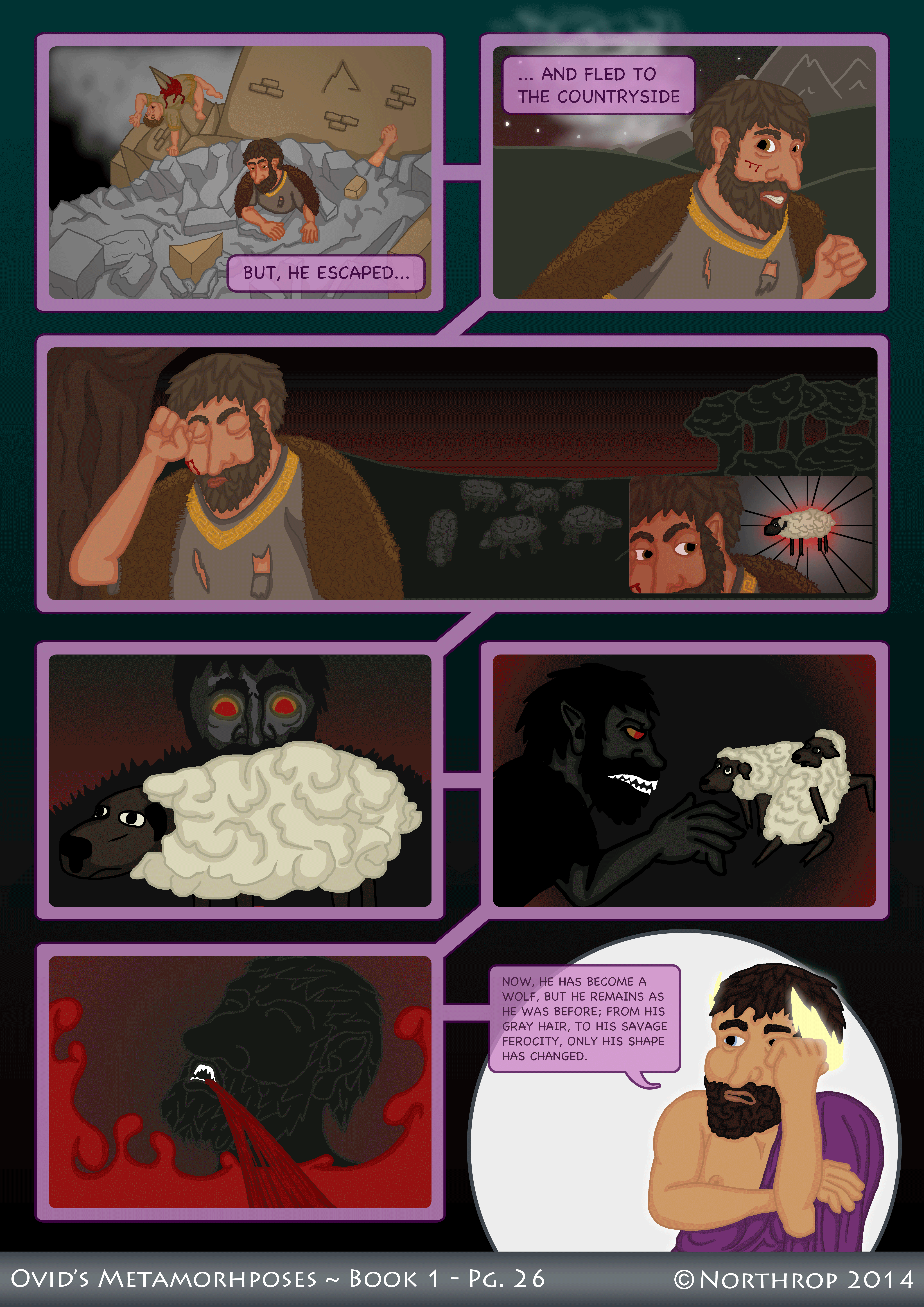Met. 1.232-9 – Lycanthropy
“TERRITUS IPSE FUGIT NACTUSQUE SILENTIA RURIS
EXULULAT FRUSTRAQUE LOQUI CONATUR; AB IPSO
COLLIGIT OS RABIEM, SOLITAEQUE CUPIDINE CAEDIS
VERTITUR IN PECUDES ET NUNC QUOQUE SANGUINE GAUDET.
IN VILLOS ABEUNT VESTES, IN CRURA LACERTI;
FIT LUPUS ET VETERIS SERVAT VESTIGIA FORMAE:
CANITIES EADEM EST, EADEM FERITATIS IMAGO EST.”
“TERRIFIED, HE FLED AND COMING TO THE SILENCE OF THE COUNTRYSIDE
HE WAILED AND TRIED TO SPEAK IN VAIN;
HIS MOUTH FOAMED, AND WITH LUST FOR HIS USUAL SLAUGHTER
HE TURNED UPON THE FLOCKS AND NOW REVELS IN BLOOD.
HIS CLOTHES TURN TO FUR, HIS ARMS TO LEGS;
HE BECOMES A WOLF AND KEEPS THE TRACES OF HIS OLD FORM:
THERE IS THE SAME GRAYNESS, THE SAME IMAGE OF FEROCITY.”
Sorry for another late update, y’all. I am still dealing with a cascading backlog of work from the end of term. This is compounded with the time taken to travel home for the holidays. I am back with my folks in Indiana, which is great, but necessitates a 12-hour journey…
Those of you who know the etymology of “lycanthropy” already knew where this was going. For those who don’t know, Lycaon is the first recorded story of a werewolf in Western literature (his name contains the Greek word for “wolf”, lykos). Ovid’s is not the first telling of the story, but it is in fact the oldest surviving complete example. We know that Hesiod, in his (now lost) Astronomica, told a story of Lycaon. There are a few other known versions as well. Ovid’s apparent innovation to the story was to make Lycaon an atheistic figure. On the contrary, in all previous versions of the story, Lycaon was actually a priest of Jupiter, who served him human flesh either out of a deluded sense of extreme piety (“only the BEST victims should be sacrificed to Jupiter!”), or out of revenge for Jupiter raping his daughter. Ovid essentially removes any sort of motive for Lycaon’s aggression towards to the god. Well, actually, not just Ovid: Jupiter is the one telling this story, remember; Ovid might have meant for us to understand that Jupiter leaves out Lycaon’s reasons on purpose. This would make sense, because it is easier to condemn an enemy who displays irrational hatred, rather than one who has a legitimate grievance (like, just to pick a random example, his daughter getting raped). This is little more than a fan-theory, though, and the story is definitely open to interpretation.
At any rate, Lycaon was mostly remembered as a werewolf. He was thought to have instituted the Lycaeum festival, a holiday dedicated to Jupiter, during which it was believed someone would become a wolf each year. This is how he would be preserved in the Roman reader’s imagination, although this festival is another detail Ovid chooses to omit from the Metamorphoses.* Ovid’s general approach to myth is actually to leave aside the religious purposes for which the stories originated, and instead focus on character development. We get a lot of insight into both Jupiter and Lycaon’s personalities here (or at least what Jupiter portrays as Lycaon’s personality). Ovid has Jupiter paint a rather black-and-white picture, in which a noble god is set upon by a perverse villain. The model is going to be made problematic as the story progresses (Ovid is FAR from pious), but it shows an already unique approach on Ovid’s part to a time-honoured tale. In this way, the Metamorphoses treats its first “real” episode of transformation as it means to go on.
Ovid’s final innovation here is connecting the Lycaon story to the one that will follow. That story, however, will have to wait for the future. I am going on a little break for the holidays, in order to recharge my batteries, and get a few more pages drawn (not to mention getting my PhD progressing). I will be back with the first page of the next episode on Monday 5 January, 2015! Until then, I hope those of you who celebrate have happy holidays, and that everyone has a great New Year! See you all in 2015!
P.S. Check for little updates, observational humour, and rants about MS Word over at my Twitter feed (@charlienorthrop). I post when the comic updates, and when it will be late, so it’s useful for keeping track of my doings and happenings.
* As he does with most festivals…

Fantastic work! Thanks for this:)